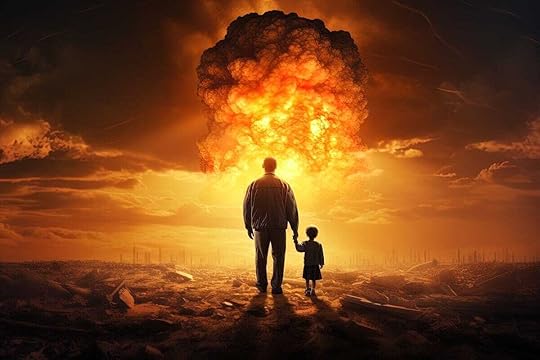Steve Bull's Blog, page 69
March 10, 2024
What It Means To Be “Collapse-Aware”
Becoming collapse-aware can make you feel like you’re going insane. You’d be crazy if it didn’t.

I became collapse-aware a few years ago, and it completely changed my life.
Collapse-aware is a term that has become much more popular in recent years, especially among climate activists. Some people prefer the term doomer or collapsnik or eco-pessimist, but I think collapse-aware is the best term to describe someone like me.
But before I can tell you what it means to be collapse-aware, I have to tell you what “collapse-aware” means. If you’re collapse-aware, it means you’ve learned enough about climate change, pollution, resource depletion, and biodiversity loss to conclude that civilization is unsustainable and will eventually collapse.
Whether the collapse happens suddenly or takes several decades, and whether it happens soon or in the distant future, is up for debate. But the end result is the same: a pre-industrial world with a much smaller population.
It could be a world where nearly everyone works from sunup to sundown to put food on the table. It could be a world where people have to hunt and gather for survival, constantly moving in search of food and resources. Or it could be a world where humans, along with most other creatures, have gone extinct.
One thing is certain: It’s all downhill from here. Living standards will decline, shortages will increase, and war will become widespread as countries fight over the last remaining resources. Looking at the world today, one could easily make the case that the collapse has already begun.
That’s the conclusion I came to back in 2020. I watched, dumbfounded, as people debated the effectiveness of facemasks and whether vaccines are safe. Things that were once common knowledge were being debated again. Facts no longer mattered.
…click on the above link to read the rest…
Today’s Contemplation: Collapse Cometh LXX–Democracy: It’s Not What You Think It Is
October 6, 2022 (original posting date)
 Chitchen Itza, Mexico (1986). Photo by author.
Chitchen Itza, Mexico (1986). Photo by author.Democracy: It’s Not What You Think It Is
Today’s contemplation stems from a recent article about Canadian politics that has prompted me to reflect further on sociopolitics and belief systems[1], but not so much about the actual content of the article — except to include the comment I left.
I am interpreting the world from within and about a particular sociopolitical system termed ‘representative democracy’[2]. A system that gives decision-/policy-/legislative-making power to ‘representatives’ who are selected/elected by a set region/group. The basic premise is that chosen representatives serve the interests of the constituents whom have elected them[3].
For anyone disenfranchised with their current crop of politicians in office and believe they are not being represented, one of the automatic responses/thoughts that the vast majority of people have as its municipality/province/state/country approaches any election is something along the lines of: “This time, if we elect just the right people, I can be properly represented, and we can set things straight and get addressing/solving our problems.”
Along the lines of this reflexive thinking are a host of other similar notions about the sociopolitical system we are enculturated into.
Elections are important. Voting matters. It is a civic duty to be informed and participate in elections. Our political system is the best, anywhere, and in all of time; it can, given the proper resources and people, solve all our problems. Each election provides a fresh opportunity to improve society. Elections are my opportunity to provide input into my society and make a difference. I get a say in my society by voting.
Elections in the sociopolitical realm have a very long history (as do representative democracies). They have changed dramatically since their early iterations but their original intent remains: a population ‘votes’ to select an individual or group of individuals to organise/lead a particular aspect of society.
Although I have grown to know better, I have to fight against the misinformed but very widely held beliefs I outlined above constantly since they seem so ingrained in my psyche. It’s like the parable about fish not knowing what water is[4]. We don’t realise we are immersed in and greatly affected by certain narratives, and we certainly tend not to question them. They just are.
This, of course, should not be surprising to me. Widely-held beliefs, regardless of their obvious contradictions and counterfactual evidence, are exceedingly common in human societies. Sometimes they get overturned or experience significant shifts, but oftentimes they do not. This is particularly so with religions, that I would contend secularism[5] has — for all intents and purposes — become (and the sociopolitical organisations that have resulted from its philosophy),
Here I am reminded of that quote often attributed to Mark Twain: “It ain’t what you don’t know that gets you into trouble; it’s what you know for sure that just ain’t so.”
Increasingly I’ve come to view the notion that the only thing that actually changes after an election is the story we tell[6]. It goes something like this: “If my team wins, all is right with the world or soon will be if we can simply ‘fix’ all the horrendous things the other team did while in office or overcome their roadblocks to our utopia. If the other team wins, the world will soon go to or continue to go to hell in a hand basket because they hold the wrong view of the world (and tend to be misguided, even evil).” All subsequent events/decisions/actions are then interpreted through this lens.
It’s important to note that I have not always felt this way about politics and the idea that it is the best means of addressing a society’s pressing issues. When I was younger I held a strong belief that voting and good representation was critically important, and it was my civic duty to be engaged in an informed manner and support the system. I voted religiously from my first opportunity after turning 18 to well into my 30s.
Various opportunities arose for me to be more deeply involved in ‘political’ matters as I weaved my way through life. From being a union representative for part-time workers in the grocery store I was employed at; to getting involved with the student union within the department I was studying within during my university education; to being a representative, executive member, and political action committee chair of the teachers’ federation during my years as a classroom to teacher; and finally, to involvement as an executive member of our local administrators’ council and senior negotiator[7] as I finished out my career in education.
All of these experiences, however, had significant moments where I began to question quite critically the entire narrative I was interpreting the world through. More and more I reflected upon these as signals that something was just not right[8]. And more and more I came to view much (if not all) of what I was a participant in and active member of as mere theatre. A play that was being performed for the benefit of all: the ‘leaders’ sustained their hold on the status quo power and wealth structures while the ‘participants’ maintained their belief that they had agency in the decisions being made. A win-win for all.
Why is any of this relevant to the impending societal decline that will accompany ecological overshoot?
Apart from the observation that there is increasing evidence that there is no ‘solution’ to the predicament of ecological overshoot, I share these thoughts to try and point out why I firmly believe (and think others should as well) that our political systems should not be where we are looking for mitigation strategies since the kind of things we should be doing are not in the elite’s interest. As a result, the political systems that have been created and maintained by our ruling elite will avoid like the plague discussions/strategies that would undermine their goals. In fact, I would argue that they will do (are doing) those things that meet their primary concern and actually serve to make our predicament worse; all the while twisting narratives to suggest the opposite.
They will encourage growth at every opportunity. Some may wrap it up in a blanket of ‘green’ stating such things as ‘clean’ and ‘sustainable’, but it will be growth requiring a further drawdown of finite resources and increasing environmental degradation accompanied by a loss of biodiversity and important ecological systems.
They will not encourage self-reliance and self-sufficiency. Instead, they will increase those policies that create dependency upon government and large corporations. They will do this by promising more and more services and responsibilities be the purview of government (and select private partnerships) thereby requiring more taxes to increase the size of the systems they control and manage — while pillaging national ‘treasuries’ in the process.
They will pay what amounts to lip service to ecological/environmental concerns (see how they will spin narratives around growth above) to appease certain societal factions, but leverage this to their advantage.
In fact, they will leverage everything at each and every opportunity to meet their primary goal of control/expansion of those things that generate revenue for them (and thus their positions of power and prestige).
They will talk about freedom, democracy, and citizen input while they tighten the screws of narrative control, censorship, surveillance, deplatforming, etc..
The political system is not your friend and you should not be turning to it for any type of salvation as more and more crises emerge because of our overshoot.
As Johann Von Goethe stated several centuries ago: “None are more hopelessly enslaved than those who falsely believe they are free.”
For the most part, ignore the theatre that is politics and move ahead in your preparations for a world experiencing significant diminishing returns on important resources and a slow (sometimes fast) breakdown in the complexities we’ve come to rely upon.
Organise locally with like-minded neighbours and/or family and begin to relocalise as much of the basic necessities of life and living. Learn those skills that are going to be needed as the world returns to a much ‘simpler’ way of living and without much (all?) of the technologies we currently have.
Ignore as much as you can the theatrical performance of the ruling elite as they weave narratives to convince you that you actually have agency in what is happening in the world outside your home/community. They only want you to believe that because having ‘legitimacy’ via narrative control and belief systems is so much easier and more efficient than having to use force[9].
But don’t fool yourself by believing that force won’t be used by our politicians if they deem it necessary. When narrative control fails, they will fall back upon their last vestige of control — physical force…only they won’t call it that and will likely spin it as for our ‘safety’ and ‘security’.
Finally, keep in mind that it takes much effort and constant vigilance to be aware of and avoid the mind traps of our societal enculturation. But it’s necessary to see and understand the world just a bit more clearly.
Finally, my comment on the article that prompted this contemplation:
One of the greatest frauds ever perpetrated on the hoi polloi by the ruling elite is that they have agency via the ballot box and thereby have some ‘influence’ in policy and actions of their government. The ruling elite have one motivation that is attempted to be met via the leveraging of everything, especially perceived crises: control/expansion of the wealth-generation/-extraction systems that provide their revenue streams and thus positions of power and prestige. Everything else is secondary/tertiary and ultimately also twisted to meet the first goal. This has been the way since the first large complex societies arose some 10,000 years ago and required organisational structures that opened the door to differential access to resources and thus power over others. One of the most effective and efficient means of maintaining the resulting power/wealth structures has been to ‘legitimise’ them in one way or another. From hereditary rule to descending from the gods to elections, the rule of the elite is assured and maintained. The plebes? They’re convenient labour, tax donkeys, and war fodder.
Article of interest:
Making the Case for Kleptocratic Oligarchy (as the Dominant Form of Rule in the United States) https://www.jstor.org/stable/pdf/23175300.pdf?refreqid=excelsior%3A3ccd9f00397b32e538b8cfa4daebfa8a&ab_segments=&origin=&acceptTC=1
If you’ve made it this far, please consider visiting my website. It contains many relevant site links and articles. It also allows you to help support my internet presence via the purchase of my ‘fictional’ trilogy — Olduvai.
[1] This is particularly relevant right now as my municipality is littered (and I use that word purposively) with signs for its local election. I cannot stand the visual blight that election signs are.
[2] https://en.wikipedia.org/wiki/Representative_democracy
[3] I almost spit my coffee out on my keyboard after rereading that sentence and chuckling…
[4] https://www.newyorker.com/books/page-turner/this-is-water; https://medium.com/age-of-awareness/you-dont-know-water-until-you-ve-left-your-fishbowl-8ad13e2a14b8
[5] https://en.wikipedia.org/wiki/Secularism
[6] It’s important to keep in mind that homo sapiens is a story-telling ape that weaves comforting and relatively simplistic narratives for a variety of reasons but mostly to rationalise our world and its complexities.
[7] I helped to negotiate multi-million dollar contracts for the hundreds of administrators in my board of education.
[8] When I sense that something is just not right, I’m reminded of a couple of lines at the beginning of a Men Without Hats’ song (Unsatisfaction) I listened to often in the 1980s: “I’m never satisfied when the answers could be real. I may not know what’s right, but I know this can’t be it!” https://youtu.be/m20F0g41ORg The ’80s had GREAT music!
[9] Please note, none of this contemplation should imply or be interpreted as a call to completely ignore the machinations of the ruling elite and allow them to run freely over the planet and its people and other species. Challenging their rule through civil protest and similar means should continue; perhaps even ramp up significantly. If nothing else, it may serve to slow their destructive policies; but don’t fool yourself and expect that it will stop it via elections and voting. I would love to see an election held and not one person shows up to vote. I would think the message from that event would resound through society for quite some time. Although at this juncture in time, I can imagine the knee-jerk response (i.e., leveraging of a ‘crisis’) would be to blame the episode on some outside state actor who hates us for our freedoms.
Today’s Contemplation: Collapse Cometh LXIX–Geopolitics: It’s About Wealth Extraction and Generation For the Ruling Class
October 2, 2022 (original posting date)
 Chitchen Itza, Mexico (1986). Photo by author.
Chitchen Itza, Mexico (1986). Photo by author.Geopolitics: It’s About Wealth Extraction and Generation For the Ruling Class
My very short contemplation today is my comment on an article that was posted in a Facebook group (Peak Oil) that I belong to. It is preceded by some additional thoughts as we stumble into our uncertain and unknowable future where I firmly believe ‘collapse’ of some nature is unavoidable.
At this particular juncture in time it is looking increasingly likely that a world war is just around the corner. In fact, there’s good evidence to suggest this has already begun — we’re simply absent the ‘official’ declaration of it.
I would additionally argue that such geopolitical events expedite our decline precipitously with their significant drawdown of resources. In fact, with our population growth and penchant for chasing the infinite growth chalice, global imperialism is one of those relatively recent human tendencies speeding up our decline.
Recognising this, we must keep in mind that our agency in these events is as close to zero as one can get. The sociopolitical system is far too ‘invested’ in status quo structures (i.e., power, wealth) to affect any shift in our trajectory. All that we can do is ‘hope’ sane heads prevail but realise that this is increasingly unlikely; in fact, I would contend the possibility of this is as close to zero as one can get as well.
What to do? Continue to prepare our families/communities for the inevitable decline caused by our ecological overshoot — a predicament that has no ‘solution’. Relocalise as much of the ‘necessities’ of life as is possible. Procurement of potable water. Food production. Regional shelter needs. And do this with the realisation that our complex, energy-dependent technologies will increasingly and eventually be little more than paperweights.
And, finally, be aware of the psychological consequences all of this will have on ourselves and those around us. Uncertainty and chaos will reign and many will struggle greatly with these. Be as understanding and ‘calm’ as you possibly can. Control what you can control and try to let the rest just go.
With the sabotage of the Nord Stream pipelines dramatically impacting the geopolitical game being played in Europe this past week, an interesting article by Gold, Goats, ‘n Guns’ Tom Luongo laid out his view on who might be responsible for this act of sabotage. It is his contention that a faction of our ruling elite (generally termed ‘globalists’ for their desire to rule over a world void of national borders) are very likely behind this as they have the most to gain from the chaos it helps to exacerbate.
My comment:
I leave nothing out of the realm of possibility when it comes to the world’s ruling elite. They leverage any and every crisis (actually, everything; it doesn’t need to be an actual crisis) to meet their primary motivation: control/expansion of the wealth-generation/-extraction systems that provide their revenue streams and thus their positions of power and prestige. All else is of secondary/tertiary concern and even they are leveraged to meet their first motivation. Power corrupts and absolute power corrupts absolutely. Such manipulation has been an evil presence in human complex societies from the get go, once differential access to resource surpluses arose and one could wield power/influence over others because of our tendency to defer/obey authority. There seems to be no ‘safe’ way out of this particular predicament of our own making.
A few relevant articles of interest:
Kissinger Warns Washington Warmongers: “Not Wise To Include Ukraine In NATO”Love him or hate him, Henry Kissinger has been awkwardly frank amid the neocon-ization of Washington’s ruling elite in…www.zerohedge.comThe Narrative That This War Was “Unprovoked” Prevents Peace
❖ Vladimir Putin has approved the annexation of four territories in eastern Ukraine, whose addition to the Russian…caitlinjohnstone.comThe War Has Just Begun
I have been attempting for several days to collect my thoughts on the Russo-Ukrainian War and condense them into…bigserge.substack.comWho profits from Pipeline Terror?
Secret talks between Russia and Germany to resolve their Nord Stream 1 and 2 issues had to be averted at any costthecradle.coReport: Russia, Ukraine Tentatively Agreed on Peace Deal in April – News From Antiwar.com
Russian and Ukrainian officials tentatively agreed on a potential peace deal during negotiations back in April 2022…news.antiwar.com
“We Will Have A Hard Landing At Some Point. I Guarantee You That.”
 Can you guess who the quote in the article title is from? I will give you a hint. It wasn’t me. I know that it sounds like it could have come from me, but it actually comes from a very big name on Wall Street. Ellen Zentner is Morgan Stanley’s chief U.S. economist, and she is the one that said it. During an interview with CNBC she warned that “the tightening impacts from monetary policy” will have enormous consequences for the U.S. economy in the months ahead…
Can you guess who the quote in the article title is from? I will give you a hint. It wasn’t me. I know that it sounds like it could have come from me, but it actually comes from a very big name on Wall Street. Ellen Zentner is Morgan Stanley’s chief U.S. economist, and she is the one that said it. During an interview with CNBC she warned that “the tightening impacts from monetary policy” will have enormous consequences for the U.S. economy in the months ahead…
“We will have a hard landing at some point. I guarantee you that. We’re all wondering: When does that come?” she said. “The point that Dimon makes is that there are these cumulative impacts that build over time, and we are in the camp that we haven’t yet seen all of the tightening impacts from monetary policy,” she added, referring to the impact of Fed rate hikes.
She makes a really great point.
The consequences of interest rate hikes are felt over time.
Higher interest rates have certainly started to cause a lot of problems, but if rates are not brought down soon the level of pain that we are experiencing will begin to go up dramatically.
Unfortunately, the Fed is not likely to reduce interest rates any time soon because inflation continues to run hotter than expected…
Inflation increased by the largest amount in almost a year, according to the Fed’s preferred measure – confirming expectations interest rates will not be cut until around June.
The so-called core personal consumption expenditures (PCE) index – which excludes volatile food and energy prices – increased 0.4 percent between December and January.
Marko Kolanovic, the chief market strategist for JPMorgan Chase, believes that the U.S. economy could be headed into “something like 1970s stagflation”…
…click on the above link to read the rest…
March 7, 2024
Europe Is Wargaming a Food Crisis
(Bloomberg) — The combined forces of El Niño and La Niña have crippled Latin American soy output. Ukrainian and Russian grain farmers have gone to war. Indonesia has banned shipments of palm oil to Europe, while China is hungry for crops. The Mediterranean region is getting more like a desert.
The year is 2024. “Food shortage in Europe? The only question is when, but they don’t listen,” says an unidentified voice in a video broadcast. The audience sits quietly — listening.
The dramatic collision of events, of course, hasn’t yet come to pass. But over two days in central Brussels last month, some 60 European Union and government officials, food security experts, industry representatives and a few journalists gathered to confront the possibility of something barely on the radar a few years ago: a full-blown food crisis.
The group sat down in a refurbished art deco Shell building to simulate what might happen, and help design policies aimed at prevention and response. A few streets away, farmers were stepping up their protests against the EU, disrupting supplies to supermarkets as if to sharpen the focus of the participants.
The plush co-working space was hardly a bunker or secure basement in a warzone. But the video images of drought, floods and civil unrest to the pounding beat of ominous music created a sense of urgency.
“Expect a level of chaos,” warned Piotr Magnuszewski, a systems modeler and game designer who has worked with the United Nations. “You may be confused at times and not have enough information. There will be time travel.”
To watch one of the best-fed regions in the world stress test its food system underscores a growing level of alarm among governments over securing supplies for their populations. In the space of four years, multiple shocks have shaken up the way food is grown, distributed and consumed.
…click on the above link to read the rest…
Europe Is Alarmed Enough To Begin Wargaming A Food Crisis
Governments of the European Union are engaged in wargames which simulate and foresee a global food crisis. A mix of major factors including the Russia-Ukraine war and impact on grain supplies there, as well as weather events like El Niño and La Niña and their impact on Latin American soy output, and the anti-EU farmers’ protests which have disrupted supermarket supply chains, have been cause for alarm, European officials say. Of course there’s also the example of how drastically a pandemic can interfere with supply chains. Panic buying was a trend and constant fear within the early months of the coronavirus crisis.
Bloomberg details of a conference held in Brussels last month that envisioned a 2024 to 2025 food shortage in Europe: “…over two days in central Brussels last month, some 60 European Union and government officials, food security experts, industry representatives and a few journalists gathered to confront the possibility of something barely on the radar a few years ago: a full-blown food crisis.”
 Getty Images
Getty ImagesPiotr Magnuszewski, a systems modeler and game designer who helped put the conference gaming scenario together told participants to “Expect a level of chaos” and cautioned, “You may be confused at times and not have enough information.”
As the report underscores, what’s remarkable about this is the fact that a continent which stands out as among the best-fed regions in the world is now busy stress testing its food system.
Below are some of the scenarios put before participants in the wargaming event last month:
* * *
Harvest failures:
“And so, it’s 2025 and there are more harvest failures. They impact animal feed prices, which curbs livestock and fish production. Some ships carrying crops turn away from Europe to cater to higher bidders elsewhere.”
Palm oil exports cut:
…click on the above link to read the rest…
March 4, 2024
Stragedy Unfolds
A bitter rant on Europe’s self-implosion
 The writing is on the wall, but who cares. Photo by Phil Goodwin on Unsplash
The writing is on the wall, but who cares. Photo by Phil Goodwin on UnsplashIt is now the second time I’m having afterthoughts upon publishing an article. After writing about how Europe’s well intended but disastrously planned environmental initiative puts us right on track to a permanent deindustrialization, thoughts kept coming up on why is that not seen as a problem by policy wonks. Perhaps understanding the parallels with what is currently unfolding in Eastern Europe could help lift the fog.
There is a looming sense of civilizational decline in Europe, stemming from the loss of cheap condensed energy. Yet, denial and hope, together with its eternal springs, still reign supreme in the higher echelons of power. There seems to be a firm belief, that no matter how unattainable the objectives we set to ourselves are, someone, somewhere will surely come up with something. Intermittent „renewables”? Costly, heavy, material and energy intensive to make batteries? Oh, someone somewhere is surely working on a storage solution (or more) to come around those minor technicalities. Not enough resources to build all that stuff? Oh, someone somewhere will surely open up a new mine… After all, demand and a good deal of subsidies always begets more supply, now isn’t it?
Well, no. That level of magical thinking is an insult on all practitioners of sorcery, and leaves even underpants gnomes’ green with envy. There are no more cheap and easy to get resources to extract, and what’s even more concerning, there are no more habitats left to destroy on this planet. Mining the seabed, and stirring up all the carbon stored in the sediment, is just one of the most disastrous ideas… Oh, and as an aside, there is no more surplus energy from oil left to do all that additional digging, smelting, transportation and manufacturing, but that’s really just me nitpicking on some minor details.
…click on the above link to read the rest…
March 3, 2024
Unsustainable Goose Chases
 As we look toward the uncertain future, it may occur to some among us that we’ll need energy on Mars. How are we going to get it? Presumably Mars has no fossil fuels—although on the plus side its atmosphere is already 95% CO2, compared to Earth’s 0.04%, so they’re likely to be less uptight about carbon emissions on the red planet.
As we look toward the uncertain future, it may occur to some among us that we’ll need energy on Mars. How are we going to get it? Presumably Mars has no fossil fuels—although on the plus side its atmosphere is already 95% CO2, compared to Earth’s 0.04%, so they’re likely to be less uptight about carbon emissions on the red planet.
At this point, we could launch into an extensive discussion, full of quantitative detail and analysis about the solar potential: insolation, materials availability, dust storm mitigation, and on and on. But the real answer to how we will get energy on Mars is probably: we won’t. We’re extremely unlikely to set up a permanent presence on Mars, if humans ever even go there at all. So the exercise would be of questionable value.
I feel similarly about discussions of full-scale renewable energy and associated storage and grid shenanigans. How will we rise to the challenge to keep modernity powered into the future? In all likelihood, we won’t. Besides the misdirection of “inexhaustible flows,” keeping modernity powered by any means looks like game-over for ecological health, and therefore humans, if pursued at all costs. So, enough with the fantasy schemes.
Why so bold? Glad you asked.
Past posts of mine have dealt with the question of what sustainability means, and associated timescales:
Ultimate Success: thinking 10,000 years ahead, what’s still possible?Can Modernity Last?: an attempt to synthesize why continuance is not in the cardsSustainable Timescales: the relevant scope is that of biological evolutionInexhaustible Flows: the dead end of materials-hungry “renewable” energy technologyAdditionally, The Simple Story of Civilization frames the current epoch as so mind-numbingly new and rapid that it boggles the mind how we could ever think of modernity as a normal time that might have staying power, rather than a fireworks show. It’s only because that’s all our short lives have shown us.
…click on the above link to read the rest…
The Endgame, Part I
The Russo-Ukrainian war and geopolitics of Europe
In early February, I posted a poll on X asking whether I should write a geopolitical piece on the Russo-Ukrainian war, adding to my series mapping a worst-case scenario for the war. While the vote count for this particular poll was not very high, an overwhelming majority supported this notion.
Before conducting the poll, developments in Ukraine in December and January had led me to ponder the outcome, or endgame, of the war. In September 2022, I had established an alternative to the western narrative of the war, spewed relentlessly by our media. In it, I argued that
Ukrainian losses are massive, passing Russian losses possibly 5-10 times.The Russian army has not collapsed, but it may have become the strongest it has been since WWII.The West (NATO) is fighting a proxy-war in Ukraine with the possible aim of regime change in Russia.Russia is about to create a war-machine not seen in Europe for a very long time, which it could use to unleash a devastating attack against Ukrainian (NATO) forces during the winter.In late-October 2022, I also noted that:
The massive force Russia is amassing and the all-but-halted progress of Ukrainian forces, tells me that we are most likely approaching a turning point in the war. In the worst case, this implies that Ukraine has already lost. Even in the best case (excluding peace) this means that the war will drag on and become a resource race between NATO and Russia.
Now, essentially all of this, except the Russian winter-offensive (2022/23) have been proven true. Ukraine has effectively lost the war, or a least she cannot win it in any plausible scenario. Just a few days ago, French President Emmanuel Macron attempted a game-changer, by “not ruling out” NATO boots in Ukraine…
…click on the above link to read the rest…
Today’s Contemplation: Collapse Cometh LXVIII–Growth is Great! Except It Isn’t.
(originally posted September 21, 2022)
 Chitchen Itza, Mexico (1986). Photo by author.
Chitchen Itza, Mexico (1986). Photo by author.Growth is Great! Except It Isn’t.
Today’s contemplation is an open letter I am sending (perhaps presenting in person, I haven’t yet decided[1]) to my local town’s council and a developer regarding a ‘proposed’ development that is moving ahead directly across the street from our home. It is not the first time I have spoken up about such community projects but will probably be the last given I have lost all faith in our local council to understand the perils and act on them, since they continue to not only pursue but cheerlead the continuing expansion of our community. ‘Growth is great, it benefits everyone’ is a refrain often posited by them.
That we reside in a significantly environmentally-sensitive region of my Canadian province makes the continued ‘development’ of the lands particularly problematic[2]. There’s always discussion of ‘sustainability’ and ‘environmental awareness’ in such proposals but these are little more than greenwashed window-dressing to impact perceptions; marketing to help sell the narrative that our ‘leaders’ are acting ‘responsibly’ and that the pursuit of ‘sustainable growth’ is a noble and just action.
While they appear open to community dialogue and consultation, I have come to consider this appearance to be a charade; theatrics to give the impression of being ‘democratic’ and ‘consultative’ — which I have also come to understand about almost all ‘politics’. Little, if anything, about my decades-long experiences and observations about our Town ‘representatives’ leads me to conclude they actually understand or even want to know about the growing predicament they are contributing to — I can just imagine the overwhelming cognitive dissonance it would create; better to be immersed in significant self-deception and ignorance.
Dear Whitchurch-Stouffville Council and Mr. Spratley,
Mr. Spratley, in your recent letter to the community about the proposed development you are spearheading at 14622 Ninth Line, you claim to be pursuing “…responsible community and community-based development with the health of the lake in mind.”
Apart from not being directly consulted, as you claim you have done with all residents that live close to the proposed development, I must challenge you on your idea of ‘responsible community development’, especially in light of your proclaimed concern over the health of the lake.
The nature of what is considered ‘responsible’ has been shifting the past number of decades. Land use can and should no longer be viewed through a purely economic lens where everything is viewed as a commodity to be turned into a profit — especially land in ecologically-important regions, which the Oak Ridges Moraine certainly is. Such an antiquated view completely ignores and/or minimises the negative environmental and ecological system impacts human ‘development’ causes.
The Ontario government itself has recognised the importance of the moraine, stating it is “… an environmentally sensitive, geological landform…”[3], and thus the motivation for them to put in place policies to protect the ecological systems of the moraine (even though they often bypass such protections by encouraging and permitting continued settlement expansion despite repeated promises not to).
Of particular concern is the impact development has on the very important aquifers and contamination of them by human development. Musselman’s Lake sits in one of the areas identified as being highly vulnerable to such contamination. And the development you are proposing increases greatly the risk to the lake and regional aquifers.
In fact, there is growing evidence that allowing land to return to nature is a far, far more responsible act in terms of long-term sustainability and ecological enhancement than forcing land system changes and increasing population density — both of which serve to destroy/degrade the natural systems every species, including humans, depend upon for their very existence. But, of course, there’s no ‘profit’ in that.
The dangers of humanity’s continuing pursuit of the infinite growth chalice on a finite planet should be self-evident to everyone, but sadly this is not so. Perhaps because we continue to believe we stand outside nature and its ecological systems, and can control them. Or because we have grown to perceive everything from an economic perspective, where land is only viewed as having ‘value’ once it has been ‘developed’ and built upon. Possibly it’s because we have allowed those who stand to ‘profit’ from such a perspective to influence excessively and unreasonably our sociopolitical systems and sociocultural narratives and beliefs.
No amount of greenwashing by having a ‘butterfly parkette’ can counter the ecological damage of constructing a dozen homes (possibly many more) on a parcel of land that is located in an environmentally-sensitive region. That such a development is even being considered for the Musselman’s Lake area of the Oak Ridges Moraine is a travesty. Council would be wise to turn down the application and amendments.
The very fact that you are in need of plan amendments to allow the use of wells to provide water for these homes because the current water system is already ‘maxed out’, speaks volumes to the overuse/overpopulation of the area that currently exists — to say little of the rather undemocratic way in which the Town forced area residents to abandon fully-functioning wells several decades ago to hookup to Town water…at a significant personal cost.
Finally, your contention that “[t]he smaller size of homes compared to the overall lot size…respects the lake and the policies that guide development” is somewhat misleading in that it is not necessarily the footprint of a home that has a negative environmental impact on a region, but the number of people that occupy it. While a large home may have oversized influence upon the resources used to construct and maintain it (e.g., fossil fuels for heat), most of the environmental consequences flow from the density of a settlement. Putting more homes and people into an area has an outsized impact given all the waste produced and resources required to sustain each person.
You may actually be sincere in your wish to do what is ‘right’ by this development, although seeking to build far more homes on the lot than established by current plans suggests you are not. Regardless, the evidence that is building in this world about the negative consequences of human expansion is coming down on the side of your proposal being detrimental, very detrimental, not beneficial.
That developments continued to get approved by our Town Council with amendments to increase significantly the number of dwellings and density is very telling about their actual concern with environmental/ecological responsibility as well — it’s non-existent.
That we continue to ignore the signals being sent to humanity by the planet and its fellow species speaks volumes about our continuing misuses of our finite world and whether we actually are acting ‘responsibly’ in our behaviour and actions. The evidence is continuing to mount that we are not. In fact, that we are doing the exact opposite of what we should be doing — degrowing our existence.
Sincerely,
Steve Bull
Please consider visiting my website. It contains many relevant site links and articles. It also allows you to help support my internet presence via the purchase of my ‘fictional’ trilogy — Olduvai.
[1] I am aware that presenting an in-person comment is likely to be received better than a written one but I have never felt comfortable speaking in public, despite having put myself in a variety of situations where I have had to. It’s one of my least favourite actions/behaviours.
[2] We reside in a region called the Oak Ridge Moraine and look out over two nearby kettle lakes. The area is part of some very important aquifers for our province.



